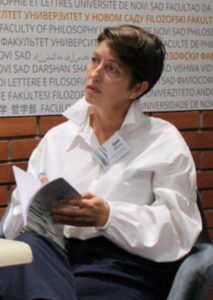 Mónika Dánél
Mónika Dánél
(Univerzita Eötvösa Loránda, Budapešť)
29 January 2025 (Wednesday) at 14:00 CET
Institute of World Literature SAS + online
Join Zoom Meeting:
https://us06web.zoom.us/j/82905745792?pwd=agmZq64nniVksvBj0Gzy1upI3fWiq9.1
Meeting ID: 829 0574 5792
Passcode: 422096
Ádám Bodor’s novels The Sinistra Zone (1992) and Birds of Verhovina (2011) are set somewhere in a Romanian, Ukrainian, Polish, Moldavian border zone that appears to be an interface between real and imaginary worlds. Both novels are examples of “commuting grammars,” and are written with a “multilingual self-awareness” (Beáta Thomka 2018) that transmit and translate the multilingual experience and polyphonic cultural memory of East-Central Europe. Bodor’s Hungarian oeuvre evokes the memory of a multi-ethnic community in the past and preserves a continuous oscillation between the inscribed memory of other languages (for example, Armenian, Yiddish, Hebrew, Ruthenian, Transylvanian Saxon, Zipser German, Romanian, Ukrainian, Polish), which are translated by the texts into a Hungarian linguistic and poetic experience. Through the multilingual hybrid characters and place names the novels provoke the monolingual reader. In both novels, the names with their performative sounds intersect different accents and pronunciation possibilities, and even if they are pronounced in a single way, they remind the reader of their multilayered multilingual being and origin. They incorporate the transformation of a multi-ethnic zone continuously displaced by different political epochs and stratified cartography. All the dialogues play out in a hybrid textual and linguistic space. The narratives are written in Hungarian, but the dialogues could be considered as translations because of the mapped multi-ethnic border zone. Therefore, the novels condense not just ‘traces’ of other languages, but their language itself could be interpreted as a translated language.
In my presentation firstly, I will analyse how these novels transform the de- and re-territorialized Hungarian language into the medium of the preserving multilingual cultural spaces, and how they create multilingual cultural memory as a transformative process of translation, as a memory that (by definition) is born and survives in translation. Secondly,
I will elaborate how these Hungarian novels intermediating multilingual memories are multiplicated by the network of their translations.
Mónika Dánél is Assistant Professor at Eötvös Loránd University (Budapest) and currently Visiting Professor at Babeș-Bolyai University (Cluj-Napoca 2024/2025). Between 2018 and 2021 she was postdoctoral researcher at the University of Oslo. Her research interests lie in contemporary East-Central European literature and visual culture, world literature, transnational literature and cinema, multilingualism, theory of intermediality, border studies, space and body theory, memory and gender studies connected to post-socialist societies. She led the international project Space-ing Otherness. Cultural Images of Space, Contact Zones in Contemporary Hungarian and Romanian Film and Literature (see: http://contactzones.elte.hu/). She co-edited two scholarly volumes Event-Trauma-Publicity (2012), Space – Theory – Culture. An Interdisciplinary Handbook of Space (2019) and published two monographs in Hungarian. Her last publication: Lost in Transition? Understanding Hungarian and Romanian 1989 Regime Change through Metalepsis and Collage. In Remembering Transitions: Local Revisions and Global Crossings in Culture and Media. Ed. by Ksenia Robbe. De Gruyter, 2023 https://doi.org/10.1515/9783110707793-004